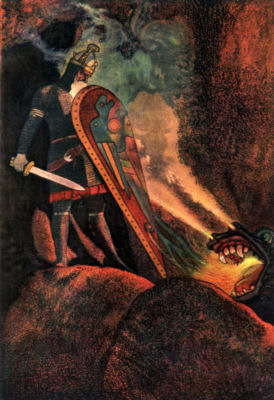Recordings
Initial Thoughts
Why so Compounded?
Three Possibilities
Closing
Back To Top
Translation
This week's section of Beowulf sees him boast for the last time, before turning and addressing his thanes. Let's listen in:
"Beowulf spoke, gave form to boast-words
for the final time: 'In youth I
risked much in combat; yet I will once more
though an old king of the people, pursue the feud,
gain glory, if only the fiend to men
will come out from his earth-hall to face me!'
Addressed he then each warrior,
each helm-wearer for truly the final time,
each dear companion: 'I would not bear a sword,
bring the weapon to the worm, if I knew how
I might otherwise gloriously grapple against
that foe, as I once with Grendel did;
but there will be hot war-fires, I expect,
breath and venom; thus I have on
both shield and byrnie. Nor will I give a foot's length
when I meet the barrow's guard, but between us two
what is to happen later on this sea wall, that is as fate,
measurer of men, is drawn to decide. I am firm of heart,
so that I may cease from boasting over this war-flyer.'"
(Beowulf ll.2510-2528)
Back To Top
Recordings
Now, to give you a sense of how that would sound:
And in Modern English:
Back To Top
Initial Thoughts
This passage, for all of its high boast density, is quite straightforward. Beowulf says that he will fight the dragon as long as he comes out of the barrow, and then turns to his men to tell them why he's carrying a shield and wearing armor. Then, he closes it all off by saying that he is "firm of heart,/so that I may desist from boasting over this war-flyer" ("Ic eom on mōde from/þæt ic wið þone guð-flogan gylp ofersitte" ll.2527-8)
That's it.
There's definitely something to say for its directness. This quality might even be the result of Beowulf's melancholic belief that this will be his last fight, and the poet's own admission of the same. But, as always, there is one curious thing to poke at - like a sleeping dragon coiled around a heap of gold.
Back To Top
Why so Compounded?
This passage uses a fair number of compound nouns: "Bēot-wordum" for "boast-words;" "mān-sceaða," for "fiend to men;" "eorð-sele" for "earth-hall;" "helm-berende;" for "helm-wearers;" "heaðu-fyres," for "war-fires;" "guð-floga" for "war-flyer."
All of these compound words share two characteristics. They're all related to war, and they're all direct , straightforward terms. Though it might be contentious, none of them are the fancier type of compound words known as kennings (like "līchama" for "body" (literally "body-raiment") or "heofon-candel" for "sun" (literally "sky-candle").
Maybe Beowulf isn't in the mood for speeches wrought with fine words like cups studded with jewels. Maybe the poet is trying to just skate on through this section being straight to the point and direct. Or maybe, there's something more going on here - something at the level of connotation and association.
Maybe direct, clear compound words, are those that are related to war specifically. Granted, you might be able to come up with more elaborate compounds that are used to describe battles and what not, but at least here, it's curious that they're so streamlined. If this is indicative of something about the poem that's one thing. But what if it's pointing to something present in all of Anglo-Saxon poetry, maybe even the culture itself?
Back To Top
Three Possibilities
If we run with the idea that this compounding cluster relates to Anglo-Saxon culture, then the compound words/phrases relating to war being straightforward and direct could mean a number of things. It could be meant to reflect the manly nature of war, men being more direct and active. Though this is a little bit anachronistic, since Anglo-Saxon women could rise to the same level of martial power as men.
Alternatively, this straightforwardness of war-related compounds could mean that war itself was something that the Anglo-Saxons regarded as straightforward. Or, maybe they saw it as something that need not be embellished when its reality is about to be brought home.
For all of Beowulf's boasting up to this point has been about the past, only now does he actually boast about what he is going to do next. Maybe the rough drafts of boasts, boasts for deeds undone, are underplayed so that they can be elevated to ecstatically glorious places after the deeds they describe are done.
Or, again, maybe this straightforward language on the part of Beowulf (and the poet) is meant to be taken as a deference to fate.
Everything is cold and windy on the promontory. Beowulf is about to face the dragon, and talking to his men before the worm comes from its underground lair. Things are tense. Things are heavy. Beowulf knows that he's an old man, "an old king of the people" ("frōd folces weard" l.2513). He knows that the dragon's breath and venom are to be feared, to be protected against. So maybe his direct boasting, and its firm, resolute ending, are meant to show his humility before fate. After all, for our two combatants, it will be as fate decides, "swā...wyrd getēoð" (l. 2526).
Back To Top
Closing
What do you make of this crowd of compound words, these straightforward and unassuming combinations? Let me know down in the comments.
Next week, be ready for more of St. Isidore's writing on deer, and Beowulf gives his final commands to the men before heading off to draw the dragon from its den.
Back To Top








